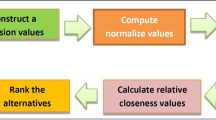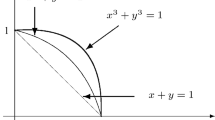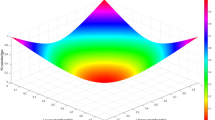Abstract
The neutrosophic soft set is the most powerful and effective extension of soft sets, which deals with parameterized values of options since it also takes into account uncertain membership and negative membership degrees. Many decision-making models have been created about this set structure, but these models have been processed over the criteria and options and external effects have not been taken into account. But even in daily life, although a option often seems to depend on a parameter, it is obvious that some external influences supporting these parameters are also taken into account. For example, if a disease is to be diagnosed, the symptoms are examined first, but also the patient’s medical history, severity of symptoms, genetic and environmental factors, countries recently visited, etc. taking into account a decision. In this study, an effective neutrosophic soft cluster structure will be created that takes into account external effects and assigns truth-membership, indeterminacy-membership and falsity-membership degrees to them. In addition, the Topsis method, which has a very important place in decision-making problems on this structure, will be applied on a hypothetical example.
Similar content being viewed by others
Data Availability
A scenario has been adapted to show the real-life place of the theoretical knowledge presented in this article. This scenario is hypothetical so there is no data source to report.
References
Zadeh, L.A.: Fuzzy sets. Inf. Control 8(3), 338–353 (1965)
Atanassov, K.: Intuitionistic fuzzy sets. Fuzzy Set. Syst. 20, 87–96 (1986). https://doi.org/10.1016/S0165-0114(86)80034-3
Molodtsov, D.: Soft set theory-first results. Comput. Math. Appl. 37, 19–31 (1999)
Maji, P.K.: Neutrosophic soft set. Ann. Fuzzy Math. Inform. 5(1), 157–168 (2013)
Cagman, N., Enginoglu, S., Citak, F.: Fuzzy soft set theory and its applications. Iran. J. Fuzzy Syst. 8(3), 137–147 (2011)
Cağman, N., Karataş, S.: Intuitionistic fuzzy soft set theory and its decision making. J. Intell. Fuzzy Syst. 24(4), 829–836 (2013)
Smarandache, F.: Neutrosophic set-a generalization of the intuitionistic fuzzy set. Int. J. Pure Appl. Math. 24(3), 287–297 (2005)
Bera, T., Mahapatra, N.K.: Introduction to neutrosophic soft topological space. Opsearch 54(4), 841–867 (2017)
Deli, I., Broumi, S.: Neutrosophic soft relations and some properties. Ann. Fuzzy Math. Inform. 9(1), 169–182 (2015)
Ozturk, T.Y., Aras, C.G., Bayramov, S.: A new approach to operations on neutrosophic soft sets and to neutrosophic soft topological spaces. Commun. Math. Appl. 10(3), 481–493 (2019). https://doi.org/10.26713/cma.v10i3.1068
Gunduz, C., Ozturk, T.Y., Bayramov, S.: Separation axioms on neutrosophic soft topological spaces. Turk. J. Math. 43(1), 498–510 (2019)
Feng, F., Li, C., Davvaz, B., Ali, M.I.: Soft sets combined with fuzzy sets and rough sets: a tentative approach. Soft. Comput. 14(9), 899–911 (2010)
Ozturk, T.Y., Yolcu, A.: On neutrosophic hypersoft topological spaces. In: Theory and Application of Hypersoft Set, p. 215. Pons Publishing House Brussels (2021)
Ozturk, T.Y., Ozkan, A.: Neutrosophic bitopological spaces. Neutrosophic Sets Syst. 30, 88–97 (2019)
Yolcu, A., Karatas, E., Ozturk, T.Y.: A new approach to neutrosophic soft mappings and application in decision making. In: Neutrosophic Operational Research, pp. 291–313. Springer (2021)
Yin, Y., Li, H., Jun, Y.B.: On algebraic structure of intuitionistic fuzzy soft sets. Comput. Math. Appl. 64(9), 2896–2911 (2012)
Riaz, M., Hashmi, M.R.: M-polar neutrosophic soft mapping with application to multiple personality disorder and its associated mental disorders. Artif. Intell. Rev. 54(4), 2717–2763 (2021)
Saeed, M., Ahsan, M., Saeed, M.H., Mehmood, A., Abdeljawad, T.: An application of neutrosophic hypersoft mapping to diagnose hepatitis and propose appropriate treatment. IEEE Access 9, 70455–70471 (2021)
Zulqarnain, R.M., Siddique, I., Ali, R., Jarad, F., Samad, A., Abdeljawad, T.: Neutrosophic hypersoft matrices with application to solve multiattributive decision-making problems. Complexity (2021). https://doi.org/10.1155/2021/5589874
Alkhazaleh, S.: Effective fuzzy soft set theory and its applications. Appl. Comput. Intell. Soft Comput. (2022). https://doi.org/10.1155/2022/6469745
Yager, R.R.: Pythagorean fuzzy subsets, In 2013 joint IFSA world congress and NAFIPS annual meeting (IFSA/NAFIPS) pp. 57-61. IEEE (2013)
Senapati, T., Yager, R.R.: Fermatean fuzzy sets. J. Ambient Intell. Humaniz. Comput. 11, 663–674 (2020)
Riaz, M., Hashmi, M.R.: Linear Diophantine fuzzy set and its applications towards multi-attribute decision-making problems. J. Intell. Fuzzy Syst. 37(4), 5417–5439 (2019)
Author information
Authors and Affiliations
Corresponding author
Additional information
Publisher's Note
Springer Nature remains neutral with regard to jurisdictional claims in published maps and institutional affiliations.
Rights and permissions
Springer Nature or its licensor (e.g. a society or other partner) holds exclusive rights to this article under a publishing agreement with the author(s) or other rightsholder(s); author self-archiving of the accepted manuscript version of this article is solely governed by the terms of such publishing agreement and applicable law.
About this article
Cite this article
Karatas, E., Yolcu, A. & Ozturk, T.Y. Effective neutrosophic soft set theory and its application to decision-making. Afr. Mat. 34, 62 (2023). https://doi.org/10.1007/s13370-023-01101-4
Received:
Accepted:
Published:
DOI: https://doi.org/10.1007/s13370-023-01101-4




